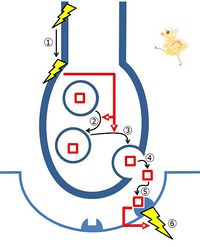「Mechanism of synaptic transmission」の版間の差分
ナビゲーションに移動
検索に移動
Soichi.Nakatake (トーク | 投稿記録) 編集の要約なし |
編集の要約なし |
||
| 11行目: | 11行目: | ||
{{QuizTitle}} | {{QuizTitle}} | ||
<GIFT> | <GIFT> | ||
When action potential reaches a synapse, the synaptic vesicle fuse with the {=pre | When action potential reaches a synapse, the synaptic vesicle fuse with the {=pre~post} synaptic membrane. | ||
The receptors for the synaptic transmitters are mainly located on the {~pre | The receptors for the synaptic transmitters are mainly located on the {~pre~=post} synaptic membrane. | ||
When a membrane of a neuron is stimulated, the membrane hyperpolarizes. {~true | When a membrane of a neuron is stimulated, the membrane hyperpolarizes. {~true~=false} | ||
</GIFT> | </GIFT> | ||
2014年11月18日 (火) 21:43時点における最新版
POINT!
| The synaptic transmitter combines with the receptor in the post-synaptic membrane and induces action potentials. |
The synaptic transmission is chemical.
When ① action potential reaches the nerve ending of pre-synaptic neuron,
② the synaptic vesicle move towards, and ③ fuses with the presynaptic membrane. This ④ releases the synaptic transmitter, which ⑤ combines with the receptor and ⑥ induces action potential in the post-synaptic membrane.
Challenge Quiz
1.
When action potential reaches a synapse, the synaptic vesicle fuse with the pre post synaptic membrane.
The receptors for the synaptic transmitters are mainly located on the pre post synaptic membrane.
When a membrane of a neuron is stimulated, the membrane hyperpolarizes. true false

